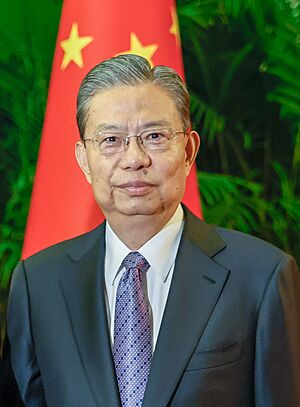Chairman of the Standing Committee of the National People's Congress facts for kids
Quick facts for kids Chairman of the Standing Committee of the National People's Congress |
|
|---|---|

|
|
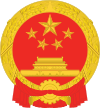
National Emblem of the People's Republic of China
|
|
| Standing Committee of the National People's Congress | |
| Member of | Council of Chairpersons |
| Nominator | Presidium of the National People's Congress |
| Appointer | National People's Congress |
| Term length | 5 years,
renewable once consecutively
|
| Constituting instrument | Constitution of China |
| Formation | 27 September 1954 |
| First holder | Liu Shaoqi |
| Deputy | Vice Chairpersons Secretary-General |
| Salary | CN¥150,000 per annum est. (2015) |
| Chairman of the Standing Committee of the National People's Congress | |||||||
|---|---|---|---|---|---|---|---|
| Simplified Chinese | 全国人民代表大会常务委员会委员长 | ||||||
| Traditional Chinese | 全國人民代表大會常務委員會委員長 | ||||||
|
|||||||
| Officially abbreviated as | |||||||
| Simplified Chinese | 全国人大常委会委员长 | ||||||
| Traditional Chinese | 全國人大常委會委員長 | ||||||
|
|||||||
The Chairman of the Standing Committee of the National People's Congress is a very important leader in China. This person is like the main speaker or leader of the Standing Committee of the National People's Congress (NPCSC). The NPCSC is a smaller, always-working group of the larger National People's Congress (NPC). The NPC is China's main law-making body.
The Chairman is officially chosen by a group called the Presidium of the NPC. This happens during a meeting of the NPC, and then the other members of the NPC approve the choice. However, in reality, the person is usually picked by the Chinese Communist Party (CCP), which is the main political party in China.
The Chairman's job is to lead the work of the NPCSC and to run its meetings. They get help from Vice Chairpersons and a Secretary-General. Together, these people form the Council of Chairpersons. If the Chairman can't do their job for some reason, one of the Vice Chairpersons can temporarily take over.
This position also has special powers under China's Constitution. For example, if both the President and Vice President can't do their jobs, and the NPC can't quickly choose new ones, the Chairman of the NPCSC can act as President.
From 1998 to 2013, the Chairman of the NPCSC was often the second most powerful person in the Politburo Standing Committee of the CCP. This committee is made up of the most powerful leaders in China. Today, the Chairman ranks below the leader of the Chinese Communist Party (the CCP General Secretary) and the President. The current Chairman is Zhao Leji. He is the third-highest ranking member of the Politburo Standing Committee.
History of the Chairman Role
When this position was first created, there was a discussion about what to call it. People thought about "chairman" or "speaker." In the end, the name "chairman" (Chinese: 委员长) was chosen. The role officially started with the 1954 Constitution. Liu Shaoqi was the very first person to hold this important job.
Between 1975 and 1983, the Chairman of the Standing Committee also acted as China's head of state. This happened because the role of President was removed from the Constitution during that time.
One interesting historical moment happened in 1989. The Chairman at that time, Wan Li, theoretically had the power to call a special meeting of the NPC to help solve a big national issue. However, he was not able to act freely, so he couldn't use this power.
From 1993 to 1998, Qiao Shi was the Chairman. He was the third most powerful person in the Politburo Standing Committee. Qiao Shi tried to make the NPC a stronger and more important part of China's government, focusing on the idea of the rule of law.
When Li Peng was elected Chairman in 1998, he received less than 90% of the votes. This was unusual because he was the only candidate, and it showed that some delegates did not fully support him.
Past Chairpersons
Here is a list of the people who have held the position of Chairman of the Standing Committee of the National People's Congress. The "NPC term" column shows if they served more than one term.
- Generations of leadership
- Mao Zedong Administration
- Deng Xiaoping Administration
- Jiang Zemin Administration
- Hu Jintao Administration
- Xi Jinping Administration
| No. | Chairperson | NPC term | Took office | Left office | Political Party | |
|---|---|---|---|---|---|---|
| 1 | 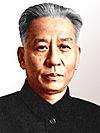 |
Liu Shaoqi 刘少奇 |
1st | September 15, 1954 | April 28, 1959 | Chinese Communist Party (CCP) |
| 2 |  |
Zhu De 朱德 |
2nd | April 28, 1959 | January 4, 1965 | |
| 3rd | January 4, 1965 | January 17, 1975 | ||||
| 4th | January 17, 1975 | July 6, 1976 | ||||
| Office vacant July 7, 1976–March 5, 1978 | ||||||
| 3 | 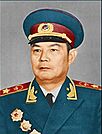 |
Ye Jianying 叶剑英 |
5th | March 5, 1978 | June 18, 1983 | Chinese Communist Party (CCP) |
| 4 | 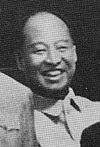 |
Peng Zhen 彭真 |
6th | June 18, 1983 | April 13, 1988 | |
| 5 | Wan Li 万里 |
7th | April 13, 1988 | March 27, 1993 | ||
| 6 | Qiao Shi 乔石 |
8th | March 27, 1993 | March 15, 1998 | ||
| 7 | 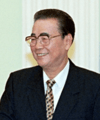 |
Li Peng 李鹏 |
9th | March 15, 1998 | March 15, 2003 | |
| 8 | 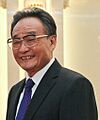 |
Wu Bangguo 吴邦国 |
10th | March 15, 2003 | March 15, 2008 | |
| 11th | March 15, 2008 | March 14, 2013 | ||||
| 9 | 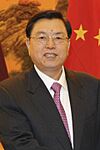 |
Zhang Dejiang 张德江 |
12th | March 14, 2013 | March 17, 2018 | |
| 10 | 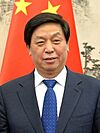 |
Li Zhanshu 栗战书 |
13th | March 17, 2018 | March 10, 2023 | |
| 11 | 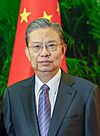 |
Zhao Leji 赵乐际 |
14th | March 10, 2023 | Incumbent | |
Timeline of Chairpersons
Timeline generation failed: 1 error found
Line 28: from: 10/03/2023 till: 02/03/2026 color:pres text:"[[Zhao Leji]]" fontsize:10
- Plotdata attribute 'till' invalid.
Date '02/03/2026' not within range as specified by command Period.
 | Jackie Robinson |
 | Jack Johnson |
 | Althea Gibson |
 | Arthur Ashe |
 | Muhammad Ali |


